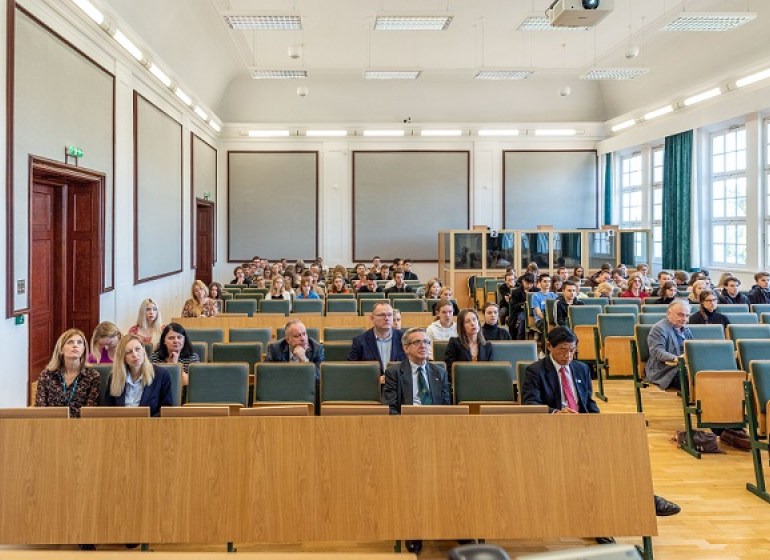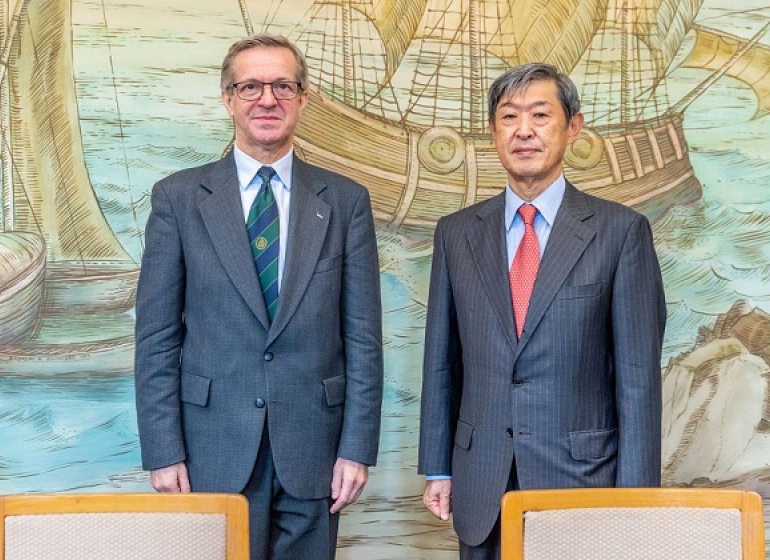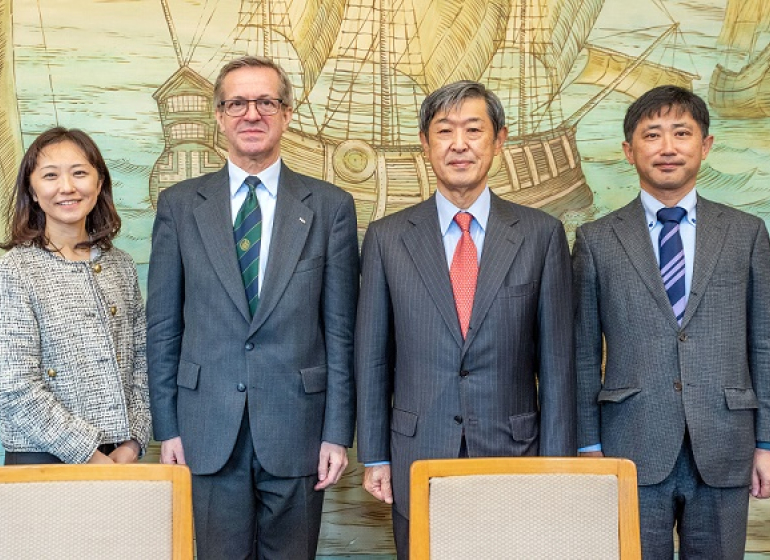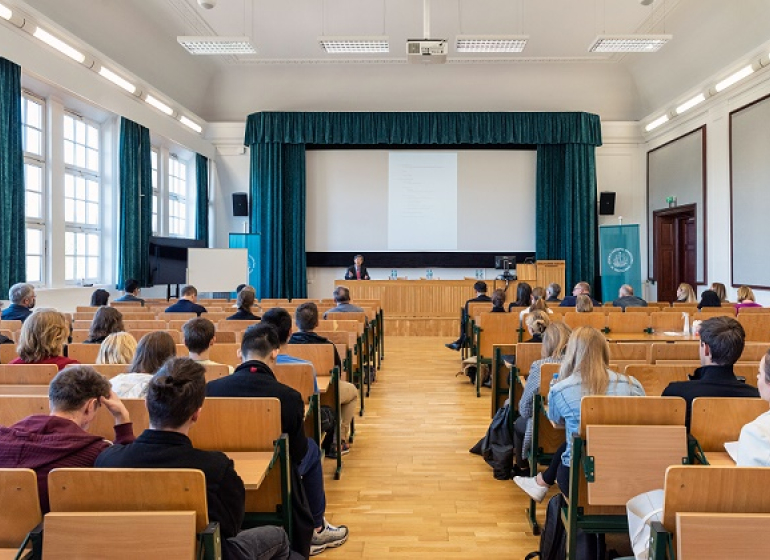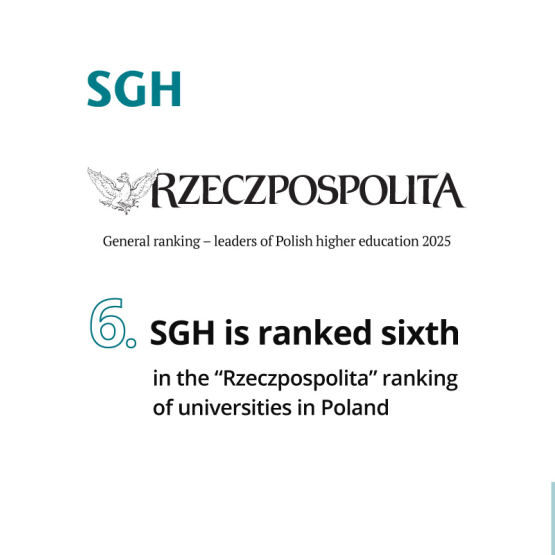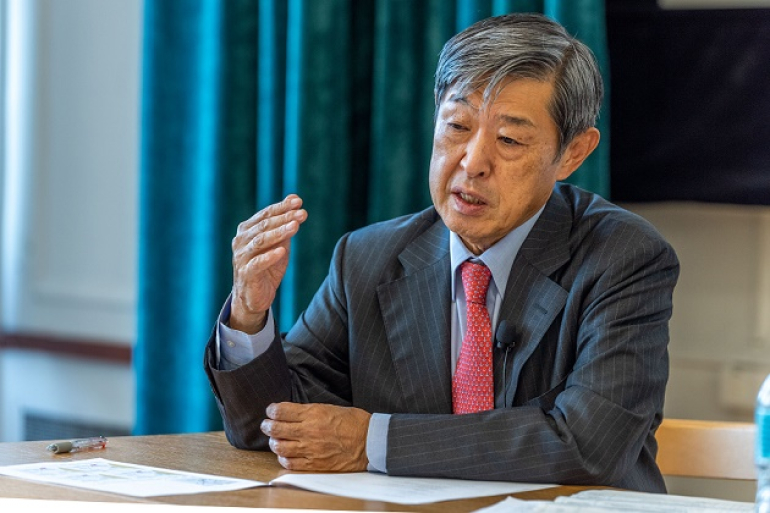
Shinichi Kitaoka, PhD, special advisor of Japan International Cooperation Agency (JICA) on October 6, 2022, delivered a lecture entitled “Recent developments of foreign and security policy of Japan in the context of regional and global challenges” at the SGH Warsaw School of Economics and gave an interview to “Gazeta SGH” on current topics due to international and security affairs in the Indo-Pacific region.
Karolina Cygonek: We have just been able to listen to your lecture. Could you briefly recount for the readers of “Gazeta SGH” what has changed in Japan's foreign and security policy recently and why?
Shinichi Kitaoka, PhD: Japan has been constrained by the Constitution Article 9, Paragraph 2, which literally prohibited the possession of military forces. It is necessary for any sovereign country to have minimum military forces to defend itself, but because of this article it was suppressed to the minimum level. That's why Japan was unable to play an important role to support the international order, even at the time of the Gulf War in 1991. But since then, Japan has started to make up some advancements, such as the participation into the UN Peacekeeping Operations, starting from United Nations Transitional Authority in Cambodia (1992-1993). Finally, under the leadership of Prime Minister Shinzo Abe, in the past ten years, Japan has made a couple of changes which can be called as some moderate developments of the normal country, so that Japan can play a responsible role to support the international peace and order.
You mentioned during the lecture that changing status quo by power is very dangerous. Japanese government is willing to deepen cooperation with the US on security issues, but with stable relations with China. The US, which is Japan's second trading partner after China, wants to limit Beijing growing influence or even its dominance in the region. So, the allies oppose China's violations of the regional status quo, especially in the East China Sea and South China Sea. So, my question is: how to reconcile security and economic interests in the Indo-Pacific region?
Of course, the security comes first. The US is also a very difficult partner, but still the US is based on the universal principles, such as the rule of law, democracy, freedom and so forth. We can have common ground with the US based on those principles. But China does not respect those principles, and therefore it's very difficult. While we continue trade and business with China, Japan’s policy would be to exclude some security sensitive areas. In the time of the Cold War, we had a system of COCOM (Coordinating Committee for Multilateral Export Controls - functioning since 1949; brought together 17 Western countries - the US, Japan, Australia and Western European countries - possessors of the most advanced technologies to put embargo on Comecon countries. Formally disbanded in 1995) and CHINCOM (China Committee, established in 1952, integrated into COCOM in 1957). There should be some types of restriction on exporting very advanced knowledge and technologies which can be used militarily.
In the early October North Korea has launched a ballistic missile over the territory of Japan. And that was for the first time since 2017. How do you perceive the growing risk of the regime in Pyongyang?
Well, it's a very difficult issue. But I'm not particularly concerned about the North Korea threat.
Why is that?
I assume that their aim could be to get financial support from Japan. For example, South Korea got our financial support after concluding the Japan‐Republic of Korea Basic Relations Treaty in 1965. The support was a kind of a quasi-reparations to compensate Japan’s colonial rule over Korean Peninsula; theoretically, we should also support North Korea. In 2002, Tokyo and Pyongyang have signed the Pyongyang Declaration under then Prime Minister Junichiro Koizumi, which stipulates that if North Korea gives up nuclear weapons and stops the missile development and if it returns the abducted Japanese people to Japan, then both countries will come to an agreement about the normalization of relations. Since then, Japan is waiting for such change. But it seems that it's very unlikely for them to do so. If their objective is to get money to support the economy, it's not very likely for them to shoot Japan.
But the regime in Pyongyang is threatening of the nuclear weapon and ballistic missiles all the time. The experts are scratching their heads over the quantity of nuclear warheads Pyongyang might have. The whole international community is talking about the growing threat of that unpredictable failed state. And you say you’re not concerned.
Not long ago, there was an incident between North Korea and South Korea. The North attacked an island in South Korea, then the South made counterattack. Actually, the damage was heavier on the part of South Korea. Considering the risk of making a frontal confrontation, North Korea just avoided to make a further attack against South Korea.
North Korea may say that its missile shooting is a response to the big navy exercise that are organized every year in the region by South Korea and the United States. Since Japan does not join in the exercise, so it makes it more difficult for North Korea to give a reason for attacking Japan.
To what extent India could be counterbalance to Chinese expansion in the Indo-Pacific region?
China’s economy is certainly now becoming three times bigger than Japan's. But still, China is surrounded by countries which are not always friendly to it. Therefore, India being there itself is a counterbalance to China’s influence in the region. I have a lot of contact with Indian leaders and Indian specialists, and they are always prepared for the confrontation with China. At the same time China is also making an unnecessary provocation in the boundary zone between Bhutan, as well as between Pakistan. When I attended the Japan-India wisemen meeting in 2001, Indian side was very serious about the possibility of conflicts in those areas.
As I said during the lecture, we are supporting the establishment of the Coast Guard in Southeast Asian countries. During the last two years or so, Chinese vessels have frequently entered Japan waters near the Senkaku Islands. Therefore, by uniting with neighboring countries around China, we can make our burden a little bit lighter.
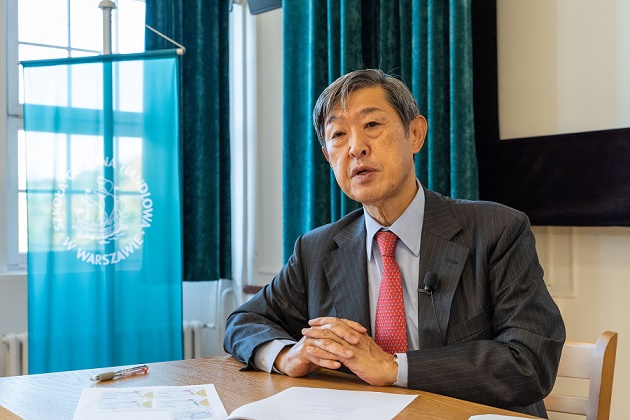
Japan unequivocally condemned Russia's aggression against Ukraine, called it a serious violation of international law, and joined Western sanctions against Russia. The experts explain that Japan's stance is due to its anticipated repercussions of this invasion on security in the Asia Pacific region. Do you agree with that thesis?
Well, the violation of the important international agreement, prohibiting the threat or the use of force against the territorial integrity, itself is the biggest reason. When Russia took over the eastern part of Ukraine and Crimea in 2014 and Abkhazia and South Ossetia in 2008, Japan’s sanctions on Russia were a bit lighter than those of European countries, because Japan’s interest lies in negotiating with Russia over the problem of the Northern Territories at that time. What we have learnt through current crisis in Ukraine is that the international community must unite to show our strong commitment to the international agreement over the territorial integrity and sovereignty of an independent country.
The experts suggest that the war in Ukraine and rising tensions between the superpowers like US, Russia and China may prompt Japan and South Korea to expand their defense capabilities by increasing arms spending or changing security policy. How would you refer to this?
First of all, as I told in my lecture, Japan has defensive policy. But in order to defend our country, we have to have a counter-attack capability or deterrence capability. We have relied on the military power of the United States for deterrence, but we should also have some deterrence capability by ourselves. And that means Japan has to change our security policy substantially. In terms of the volume of the security budget, certainly Japanese government is now aiming to fulfill NATO's standard of 2% of GDP in five years.
Until now it was around 1% of Japanese GDP spent on defense?
Actually, it’s over 1 %, because our calculation system is different from NATO member countries’ system. For example, pensions for retired Self-Defense Forces personnel are not included in the calculation of defense budget, and the coastguard budget is not included as well. Therefore, if we introduce the NATO system of calculation, then Japan’s defense spending would be roughly 1.3% of GDP. And now the 2% target is being discussed in Japan.
Japan now is, so to speak, countering the influence of China and Russia in Africa. It's using the TICAD initiative to do so. At the eighth Tokyo International Conference on African Development (TICAD8) held in Tunisia in August this year, Japanese Prime Minister Fumio Kishida promised $30 billion over three years for development programs in Africa. Beginning with TICAD7 in 2019 the tone of Japan-African summits is clearly calculated to compete politically with China. How does Japan reconcile this with the fact that China is its first trading partner?
Well, it's not contradictory. We are not competing with China. We are trying to support African countries. This is the first goal. The competition with China is not particularly important. Now, China’s pace of economic development seems to slow down and its way of lending money is somewhat problematic. The Chinese are lending a lot of money and many countries, such as Kosovo, Sri Lanka, and Pakistan, are now in a danger of bankruptcy.
China is not a member of OECD. Therefore, Chinese lending are not bound by the OECD rules. We are bound by the rules, such as the debt service ratio and environment and social considerations. There are many conditions that Chinese lending have not been bound. Therefore, they can lend their money as they like. And also, some dictators in some countries may be willing to accept those money, including the bribery, I believe.
There are countries which have borrowed too much money. And now they are in a very difficult situation because they cannot pay it back. Therefore, now many African countries have become very cautious about borrowing money. Secondly, the Chinese can build infrastructure quickly, but taking into account the cost of maintenance the infrastructure built by the Chinese is not always very cheap, it may become relatively expensive. And Chinese companies bring workers from China and that aspect becomes a pressure for the local communities – they are afraid that they may lose their jobs. To sum up, the way of Chinese assistance to Africa may not be as efficient as it seems in a long term. Our approach is more sophisticated: we are working with Africa in an equal footing. We always consider the possibility of technology transfer through working with African people.
Read also: "Action Diplomacy": Japanese Ambassador to Poland Akio Miyajima at SGH Warsaw School of Economics.
Shinichi Kitaoka, PhD:
Special Advisor to the President of the Japan International Cooperation Agency (JICA)
Previously:
President of the Japan International Cooperation Agency (JICA)
Rector of the International University of Japan (2012-2015)
Professor of National Graduate Institute for Policy Studies (GRIPS) (2012-)
Professor of Graduate Schools for Law and Politics, University of Tokyo (1997-2004, 2006-2012)
Ambassador Extraordinary and Plenipotentiary, Deputy Permanent Representative of Japan to the United Nations (2004-2006)
Professor of College of Law and Politics, Rikkyo University (1985-1997)
Doctor Kitaoka's specialty is contemporary Japanese politics and diplomacy. He obtained his BA (1971) and his PhD (1976) both from the University of Tokyo. He is Emeritus Professor of the University of Tokyo.
He has numerous books and articles in Japanese and English including A Political History of Modern Japan: Foreign Relations and Domestic Politics (Tokyo: Yuhikaku, 2011), Political Dynamics of the United Nations: Where Does Japan Stand? (Tokyo: Chuokoron-Shinsha, 2007) and Japan as a Global Player (Tokyo: NTT Publishing, 2010)
He received many honors and awards including the Medal with Purple Ribbon for his academic achievements in 2011.
